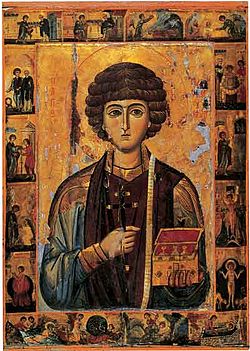Saint Panteleimon
| Saint Pantaleon (Panteleimon) | |
|---|---|

13th Century Icon of Saint Panteleimon, including scenes from his life, from the Monastery of St. Katherine on Mount Sinai.
|
|
| Great-Martyr and Unmercenary Healer | |
| Born | c. 275 Nicomedia |
| Died | 305 Nicomedia |
| Venerated in |
Anglicanism Eastern Orthodoxy Oriental Orthodoxy Roman Catholicism |
| Major shrine | Pantaleon Monastery in the Jordan desert, Pantaleon Church built by Emperor Justinian in the 6th century, Constantinople |
| Feast | 27 July / (9 August) |
| Attributes | A compartmented medicine box, with a long-handled spatula or spoon; a martyr's cross. |
| Patronage | Physicians, midwives, livestock, lottery, lottery winners and victories, lottery tickets, invoked against headaches, consumption, locusts, witchcraft, accidents and loneliness, helper for crying children |
Saint Pantaleon (Greek: Παντελεήμων [Panteleímon], "all-compassionate"), counted in the West among the late-medieval Fourteen Holy Helpers and in the East as one of the Holy Unmercenary Healers, was a martyr of Nicomedia in Bithynia during the Diocletianic Persecution of 305 AD.
Though there is evidence to suggest that a martyr named Pantaleon existed, some consider the stories of his life and death to be purely legendary.
According to the martyrologies, Pantaleon was the son of a rich pagan, Eustorgius of Nicomedia, and had been instructed in Christianity by his Christian mother, Saint Eubula; however, after her death he fell away from the Christian church, while he studied medicine with a renowned physician Euphrosinos; under the patronage of Euphrosinos he became physician to the Emperor Maximian or Galerius.
He was won back to Christianity by Saint Hermolaus (characterized as a bishop of the church at Nicomedia in the later literature), who convinced him that Christ was the better physician, signalling the significance of the exemplum of Pantaleon that faith is to be trusted over medical advice, marking the direction European medicine was to take until the 16th century.
St. Alphonsus Liguori wrote regarding this incident:
He studied medicine with such success, that the Emperor Maximian appointed him his physician. One day as our saint was discoursing with a holy priest named Hermolaus, the latter, after praising the study of medicine, concluded thus: "But, my friend, of what use are all thy acquirements in this art, since thou art ignorant of the science of salvation?
By miraculously healing a blind man by invoking the name of Jesus over him, Pantaleon converted his father, upon whose death he came into possession of a large fortune, but freed his slaves and, distributing his wealth among the poor, developed a great reputation in Nicomedia. Envious colleagues denounced him to the emperor during the Diocletian persecution. The emperor wished to save him and sought to persuade him to apostasy. Pantaleon, however, openly confessed his faith, and as proof that Christ is the true God, he healed a paralytic. Notwithstanding this, he was condemned to death by the emperor, who regarded the miracle as an exhibition of magic.
...
Wikipedia
